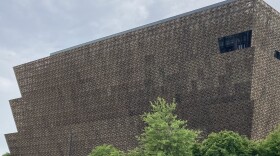Every other Tuesday, the team behind Civics 101 join NHPR’s All Things Considered host Julia Furukawa to talk about how our democratic institutions actually work.
People here in New Hampshire and across the country turned out in record-breaking numbers to vote in last week’s elections. So what’s actually happening to all those ballots now that they’ve been cast?
This week, Civics 101 senior producer Christina Phillips joined Julia to talk about how votes are verified starting here in New Hampshire and all the way through Congress.
Transcript
Let's start with the end of Election Day. So what's been happening behind the scenes in the last week from the time the polls closed until now?
So right now, we are probably completing the canvass and the certification phase on the local and state level. So the canvass is where election workers make sure all the ballots are counted, including verifying and counting mail-in ballots and making sure that all the equipment was working properly, maybe doing recounts if there's very close election results in certain places. Then local officials will certify those results and they will send those certified results to our Secretary of State, who basically checks to make sure that all the results from every local precinct are in, nothing is missing. And then the Secretary of State will say, 'Okay, I've got the certified results from every county. These are the results in this state.'
Got it. So the election results get certified. They get the stamp of approval. But how does Congress get involved?
Yeah. So first electors will cast their ballots. And now remember we have four electoral votes in New Hampshire. So on Dec. 17, the four electors that were chosen by the Democratic Party -- because Kamala Harris won in this state, and it's an all or nothing -- they will cast their four votes for Kamala Harris and those will get sent to Congress. And then on Jan. 6, Congress will meet. Both chambers will gather together with the vice president, and the vice president, Kamala Harris, will open all of these electoral results for each state and count them up. [It's] important to note that the vice president has no say over where votes go. The vice president can't say, 'Actually I would like to challenge these results in these states.' Members of Congress can challenge those results under very narrow guidelines. But it takes 20% of the House and 20% of the Senate to even raise a challenge. And then once all of those votes have been counted, that's when there is an official winner based on whoever gets 270 or more electoral votes.
And Christina, what about the courts? What's their role in the election?
So courts are there to make sure local and state election officials follow the law and are allowed to do their jobs correctly. So this means they can intervene, you know, before Election Day or during Election Day if officials need to adapt to weather or issues with machines. It also means that if a candidate challenges the results at a local or state level, the courts can decide whether those challenges have merit and how to proceed. It also means that if, say, local officials are not certifying results, if they say that they can't certify or they're refusing to certify, the courts can step in and order them to certify or appoint someone else to certify the results because they're supposed to be certified.
And with so much misinformation about election security and the whole election process out there, what do you think is most important for folks to know?
Well, I think in working on this episode, I learned that this process is so transparent and there are so many little steps along the way. You can find the minute by minute guidelines of everything that's supposed to happen, and who's in charge of it on the local and the state and the national level. And it's very transparent. And also, I think if you've thought of any sort of issue that could go wrong, I promise you a local election official is thought of it, and they've written up a backup plan. So there's no thing that could happen that would surprise anyone. There's a process for all of it.









